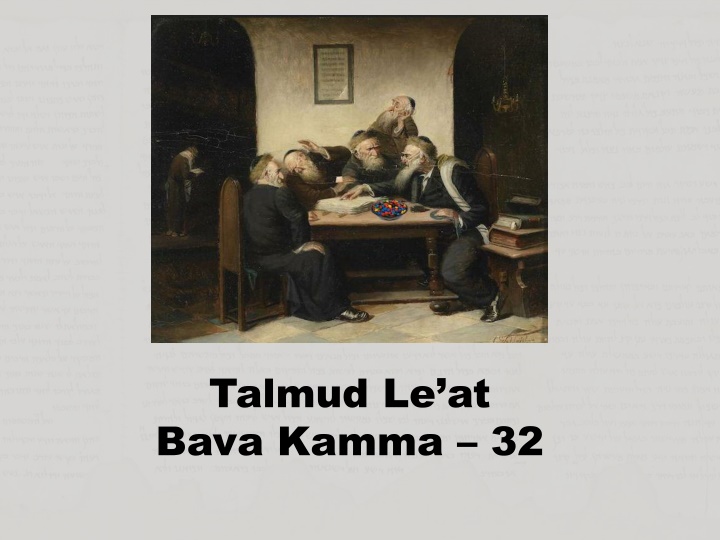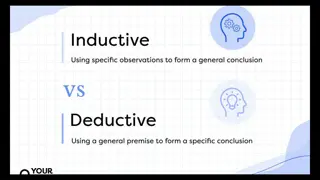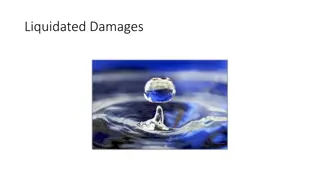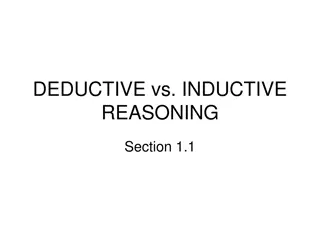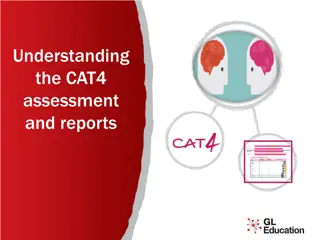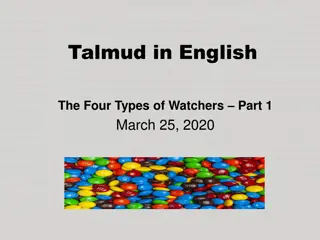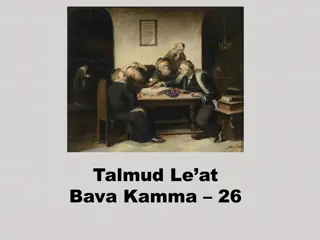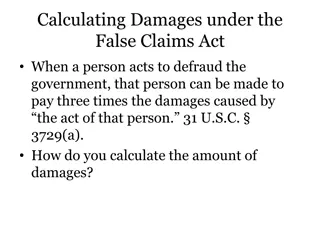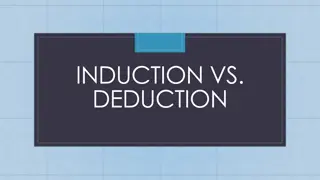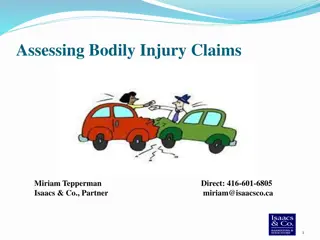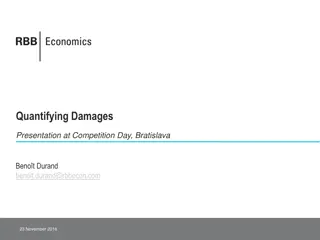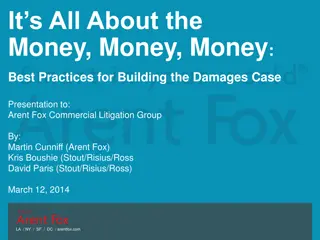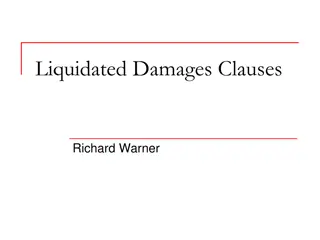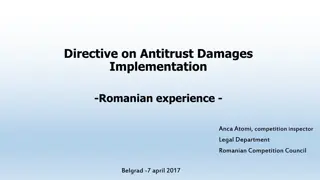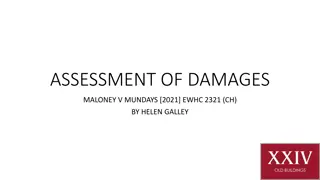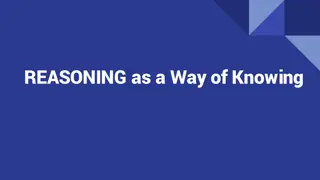Insights from Talmudic Teachings on Damages and Legal Reasoning
Delve into Talmudic discussions on damages in victimology, principles of logic, punishment, laws of purities, and Talmudic terminology like Gezerah shavah. Explore cases involving impurity, sheretz, zav, and the application of kal v'Homer and Dayo. Gain a deeper understanding of legal reasoning and ancient Jewish traditions.
Download Presentation

Please find below an Image/Link to download the presentation.
The content on the website is provided AS IS for your information and personal use only. It may not be sold, licensed, or shared on other websites without obtaining consent from the author.If you encounter any issues during the download, it is possible that the publisher has removed the file from their server.
You are allowed to download the files provided on this website for personal or commercial use, subject to the condition that they are used lawfully. All files are the property of their respective owners.
The content on the website is provided AS IS for your information and personal use only. It may not be sold, licensed, or shared on other websites without obtaining consent from the author.
E N D
Presentation Transcript
Talmud Leat Bava Kamma 32
Review What are the damages in the victim's domain? R. Tarfon Full Sages Half Principles of Logic Kal v'Homer "All the more so" Dayo "Punishment fits the crime" Miriam's punishment Laws of Purities ("Toharot") Contact & Carrying Who's a Zav? 2 Talmud Le'at - 32
Bava Kamma 25b : " " , " R. Aha of Difti said to Ravina: Behold, this Tanna does not apply dayo even when it does not contradict a kal vehomer 3 Talmud Le'at - 32
Bava Kamma 25b ? , : : , , ? For it was taught: a mat with a corpse, from where? This is a logical conclusion: just as small jugs that remain pure with a zav, become impure with a corpse, is it not right that mats that are impure with a zav are impure with a corpse? 4 Talmud Le'at - 32
Bava Kamma 25b ! ? " Now this reasoning applies both to impurity for a single day and impurity for seven! And why? Say kal vehomer was effective for impurity for a single day and dayo was effective to exclude impurity for seven 5 Talmud Le'at - 32
Bava Kamma 25b : , " : " : " " ? , , He said to him: It was already raised by R. Nahman b. Zachariah to Abaye, and Abaye answered him: the Tanna brought proof from a mat with a sheretz and this is what he says: From where do we know a mat with a sheretz? It is a logical conclusion if small jugs that are pure with a zav, become impure with a sheretz, is it not logical that mats that are impure with a zav become impure with a sheretz? 6 Talmud Le'at - 32
Talmudic Terminology Gezerah shavah - Numbers 9:2 ("Similar Law") - - Let the children of Israel keep the Passover in its appointed season Numbers 28:2 My food which is presented unto Me for offerings made by fire, of a sweet savor unto Me, shall you observe to offer unto Me in its appointed season - 7 Talmud Le'at - 32
Two Prooftexts Leviticus 11:32 - - - , - - And upon whatsoever any of them, when they are dead, does fall, it shall be unclean; whether it be any vessel of wood, or clothing, or hide, or sack Numbers 31:20 And as to every garment, and all that is made of hide, and all work of goats' hair, and all things made of wood, you shall purify - - , - - - - 8 Talmud Le'at - 32
Bava Kamma 25b ? " " " " " " , , , " " ; Then from where mats with a corpse? it is stated cloth" or "hide (Leviticus 11:32) with a sheretz, it is stated, cloth" or "hide (Numbers 31:20) with a corpse just as cloth or hide is stated with a sheretz, a mat is impure from it; so cloth or hide is stated with a corpse, a mat is impure with it 9 Talmud Le'at - 32
Bava Kamma 25b ! : , ? It is free! For if it is not free, it can be refuted: What to a sheretz, which defiles at the amount of a lentil? Can you say with a corpse that does not defile at the amount of a lentil but the amount of an olive? 10 Talmud Le'at - 32
Bava Kamma 25b ! "' " " " ; ? " " " : " Indeed, it is free! Now, sheretz is compared with semen as it is written, Or a man from whom goes forth (Leviticus 22:4), and next to it Or a man who touches a sheretz ; it is written with regard to semen, And every cloth and every hide, upon which is semen (Leviticus 15:17) Cloth or hide the Merciful One wrote about sheretz; why do I need it? Learn from this: to make them free 11 Talmud Le'at - 32
Bava Kamma 25b ! ; " " ? , Still, it is free only on one side! This works out well according to the one that says free from one side; one can derive from it and not refute But according to the one who says that one can derive and refute, what is there to say? 12 Talmud Le'at - 32
Bava Kamma 25b " " " " " ? , " " With regard to a corpse, are also free Since a corpse is juxtaposed to semen as it is written, And one who touches any person who is impure or a man from whom semen is issued (Leviticus 22:4) and it is written with regard to semen, And every cloth, and every hide, upon which is found semen (Leviticus 15:17) Cloth or hide the Merciful One wrote concerning a corpse, why do I need it? Learn from this to make them free, and it is free from both sides 13 Talmud Le'at - 32
Bava Kamma 25b , , " " ? This works well according to the one who says Derive from it and interpret it according to its place but for the one who says Derive from it and from it , what is there to say? 14 Talmud Le'at - 32
Bava Kamma 25b : " " , Rava said: The verse states, And you shall wash your clothes on the seventh day (Numbers 31:23) All impurities that are corpse tumah, are not less than seven 15 Talmud Le'at - 32
Bava Kamma 25b : , ; , ; " ? But let Tooth and Foot obligate in the public domain, through a kal vehomer: if Horn in the victim's domain, he pays only half damages; in the public domain he is still liable Tooth and Foot in the victim's domain, he pays full damages; is it not logical that in the public domain he should be liable? 16 Talmud Le'at - 32
Bava Kamma 25b " " " The verse says, And grazes in other another one s field (Exodus 22:4), and not in the public domain 17 Talmud Le'at - 32
Bava Kamma 26a ? " " " ! " Are we saying "Full"? We are saying "Half"! 18 Talmud Le'at - 32
Exodus 21:35 - -- - - - - - When a man s ox injures his neighbor s ox and it dies, they shall sell the live ox and divide its value; they shall also divide the dead animal 19 Talmud Le'at - 32
Bava Kamma 26a " " The verse says, And they divide its value this one s value and not that one's value 20 Talmud Le'at - 32
Bava Kamma 26a " , : " ; ? And let one be liable for Tooth and Foot in the victim's domain for only half damages Through a kal vehomer from Horn: and if Horn is liable in the public domain, in the victim's domain he only pays half damages Tooth and Foot in the public domain are exempt; is it not logical that in the victim's domain they pay half damages? 21 Talmud Le'at - 32
Bava Kamma 26a ", " The verse says, He shall pay (Exodus 22:4), proper payment 22 Talmud Le'at - 32
Bava Kamma 26a " " , " ? " ; And one is not liable for Horn in the public domain Through kal vehomer: if Tooth and Foot in the victim's domain pay full damages, in the public domain they are exempt Horn in the victim's domain is half damages; is it not logical in the public domain, exempt? 23 Talmud Le'at - 32
Bava Kamma 26a " " " R. Yohanan says: The verse states They shall divide (Exodus 21:35); there is no difference for half damages, not in the public domain and not in the private domain "; : 24 Talmud Le'at - 32
Exodus 21:29-30 - - - -- But if the ox was wont to gore in time past, and warning has been given to its owner, and he has not kept it in, but it has killed a man or a woman; the ox shall be stoned, and its owner also shall be put to death If there be laid on him a ransom, then he shall give for the redemption of his life whatsoever is imposed upon him 25 Talmud Le'at - 32
Bava Kamma 26a , " ; , ? , And let a person be obligated for the ransom Through a kal vehomer: if an ox is not obligated for the four payments, but is obligated for the ransom; A person, who is obligated for the four payments, is it not logical he be obligated for a ransom? 26 Talmud Le'at - 32
Bava Kamma 26a " " The verse states, Whatever is imposed on him (Exodus 21:30) "on him"; but not on a person 27 Talmud Le'at - 32
Bava Kamma 26a , , " : ? But let the ox be obligated for the four payments Through a kal vehomer: if a person is not obligated for the ransom is liable for the four payments An ox that is liable for the ransom, is it not logical that he should be liable for the four payments? 28 Talmud Le'at - 32
Bava Kamma 26a " " : The verse states, A person to his fellow (Leviticus 24:19) and not an ox to its fellow 29 Talmud Le'at - 32
Bava Kamma 26a , : ? " ? , They asked: the Foot that trampled on a child in the victim's courtyard, must he pay the ransom? Shall we say that this is like Horn? Horn that does so two or three times, it becomes its normal for it and pays the ransom Here too it is not different or perhaps Horn has the intention to cause damage, and this does not have the intention to cause damage 30 Talmud Le'at - 32
Bava Kamma 26a : , ' Come and hear: One who brings his ox into a homeowner s courtyard without permission and it gores the homeowner who dies; the ox is stoned, while its owner, whether tam or mu'ad, must pay ransom, the words of R. Tarfon " ; 31 Talmud Le'at - 32
Bava Kamma 26a ? " ? " From where does R. Tarfon learn that a tam pays a full ransom? Is it not because he holds like R. Yose Hagalili who says that a tam pays half ransom in the public domain, and he derives it from a kal vehomer from Foot? Therefore, there is ransom for Foot 32 Talmud Le'at - 32
Bava Kamma 26a : R. Shimi of Nehardea said: this Tanna can bring proof from damages done by Foot 33 Talmud Le'at - 32
Bava Kamma 26a ? : But let us refute it: what are the damages done by Foot, for these apply to fire? Based on hidden things 34 Talmud Le'at - 32
Bava Kamma 26a ? What are hidden things? For these apply to Pit Based on vessels 35 Talmud Le'at - 32
Bava Kamma 26a ? ? What are vessels? These apply to fire Based on hidden vessels What are hidden vessels, for these apply to a person? 36 Talmud Le'at - 32
Bava Kamma 26a ? " " Rather, is it not to learn from this that he derives based on ransom from Foot? Thus there is ransom from Foot Learn from it 37 Talmud Le'at - 32
Bava Kamma 26a , : : " " " ? " ? : R. Aha of Difti said to Ravina: so too, it is reasonable that ransom from foot, for if you might have thought that there is no ransom in from Foot, and that the Tanna derived from damages done by Foot, let us refute: What is the damage done by Foot that are applicable to Foot? Rather, is it not to learn from this that he derives based on ransom from Foot? Thus there is ransom from Foot. Learn from it 38 Talmud Le'at - 32
